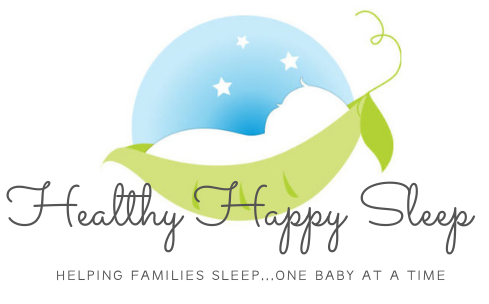Navigating the Holidays with Your Well-Rested Child

No matter how prepared we are as parents, or how well rested our children are, the holidays tend to bring unexpected twists and turns that can derail any healthy sleeper. Below I’ve included some helpful strategies to get you through the craziness so that your child’s sleep can remain on track.
First of all, what does a well-rested child look like? You’ve got a healthy sleeper on your hands if she:
- Sleeps through the night without crying, calling for you or getting out of bed. Frequent night-waking is a sure sign that your child is overtired!
- Goes down for naps and bedtime without fussing, fighting or screaming. Many toddlers will delay bedtime, which is common and doesn’t signify an issue. However, if she seems irrational, flailing, screaming, kicking, etc, you know she’s past her threshold and isn’t getting the sleep she needs overall.
- Wakes up happy from each sleep period. If she wakes up “on the wrong side of the bed” the culprit is most likely that her naps/bedtime hour are not in line with her biological rhythms.
- Is able to flex a bit when it comes to sleep times and wake times. One hiccup in the routine doesn’t change much, and she returns to her usual sleep schedule without a hitch.
- Is a happy kid in general. This doesn’t mean she doesn’t have tantrums and disagree with authority at times, but overall she should be pleasant and have the ability to adapt to day-to-day activities.
So what is the breaking point where a well-rested child is pushed too far? How close can we come before they cross the line into the overtired category? And how do we keep them from spinning out of control and creating negative patterns and habits?
The comforting news is that a child who starts this stressful season with a healthy sleep foundation will be able to handle quite a bit before falling off the deep end. Yes – Illness, travel days, inflexible schedules, uncomfortable sleeping arrangements, etc. all interfere with your ability to protect your child’s sleep, but this doesn’t mean she’s doomed! If she gets sick, it’s ok to be with her in the night for 1-2 nights and give her some extra attention when she would otherwise be sleeping. If your great aunt and uncle have a super late dinner planned and your little one will have to stay up for 3 hours past her bedtime, it won’t jeopardize things exponentially. If she has to go down for her nap later than usual for an entire week because your daily schedule is not in your control, don’t sweat it! We know a late nap isn’t ideal, but a healthy sleeper will adapt and catch up during another sleep period. One week will not interfere enough to cause lasting issues!
The problem comes when bad habits are formed from repeated breaks in the routine as well as uncharacteristic responses during sleep periods from parents. When the snuggles for sickness become part of her routine in between sleep cycles. Let’s be honest – it’s very easy to create new routines and dependencies when you’re stressed and things are a little wacky with shopping, visiting, traveling etc. But whatever the case may be, the tweaks and changes made during these times must be seen as temporary adaptations to temporary situations.
To avoid permanent habits, make sure you’re compensating for the lack of sleep by watching her closely and making up for the sleep debt that comes with stretching her too long in between sleep periods or being with her in the night while she’s sick . Here’s how:
- If your child misses a nap, push the next sleep period earlier. For example, if you’re out to lunch with family and it runs longer than expected, you won’t want to put your toddler down for a nap after 2:30 because that would be too late for her to obtain quality sleep (her natural rhythms accept sleep best between 12-2pm, so her nap should begin within that time frame). By skipping the nap, she’s incurring a sleep dept because her body physically needs the sleep for mental and physical growth and development. The fastest way to compensate for this 1-2 hour lack of sleep would be to put her to bed 1-2 hours earlier than her usual bedtime. This will ensure no wake-ups in the night and a well-rested child in the morning. But what if you are unable to get her to bed early that night because of more holiday festivities? Most likely, she will be very tired and not very much fun to be around, but don’t worry too much because there’s always the next sleep period to get her back to sleeping well. So in this case, you would put her down earlier than usual for her nap the next day and then depending on how long she sleeps her bedtime may need to be pushed earlier as well to get her fully caught up.
- If your child is ill and can’t sleep, of course you’ll go to her and be with her to help her sleep. I always go back to the “magic of 3’s”. It seems that there is something special about babies and doing things 3 times…if she sleeps through the night for 3 nights in a row, you can assume this is the new routine…if you can get through the first 3 days/nights of sleep training, she’s permanently learned the new skill…3 nights in a new place and she’s sleeping just like she does at home…3 nights without a pacifier and she no longer requests it, etc. Throughout my mothering years and my studies as a sleep consultant I’ve realized that after that 3rd day/night has passed, the child has created and solidified a new routine or habit! With that said, it’s very important that you try to limit your extra attention/sleep assistance to 2 nights. If you get to that 3rd night and you’re still helping her fall asleep due to illness, it’s going to be really hard to go back to the way things once were. Usually the first 2 nights of an illness are the worst anyway, so the extra visits shouldn’t be needed as much after that point! Also, make sure she’s getting in bed for naps and bedtime earlier than usual because her sleep is not continuous or high quality while she’s sick. Shoot for 1 hour earlier than she usually goes down to ensure she gets into that deep sleep state quickly for speedy healing!
- If your child is napping great from all the activity but you find these long naps interfere with the rest of her sleep schedule, you’ll need to make some adjustments to protect the bedtime hour. Long naps are awesome, but if they’re too long she’ll miss out on the best quality sleep that comes in the early evening hours between 6-8pm. Getting children to bed before 8pm is vital to their sleep health, so wake her by 3:30pm to make sure she’s ready to sleep again within this time frame.
- If you have to make a decision about whether or not to push her nap/bedtime later, always look at her pervious sleep period. If she slept over 1 hour during the nap, woke up happy and seems to be in good spirits overall, she’s most likely ok to push the limits a bit. However, if her nap was short or she seems grumpy and out of sorts, the decision should be easy and the priority should be to get her sleeping soon!
- If you’re traveling, read my advice here about specific ways to combat overtiredness and fatigue while away from home.
In general, well-rested kids can flex and adapt easily to new environments, routines and later sleep times on occasion. However, don’t take advantage of this! Always look at the last sleep period to determine what her needs are. When in doubt, shoot to put her down earlier to make sure she’s able to catch up wherever there is a need. If you don’t look closely and compensate effectively, chances are good that you’ll be required to do damage control when the holiday excitement has dissipated.
